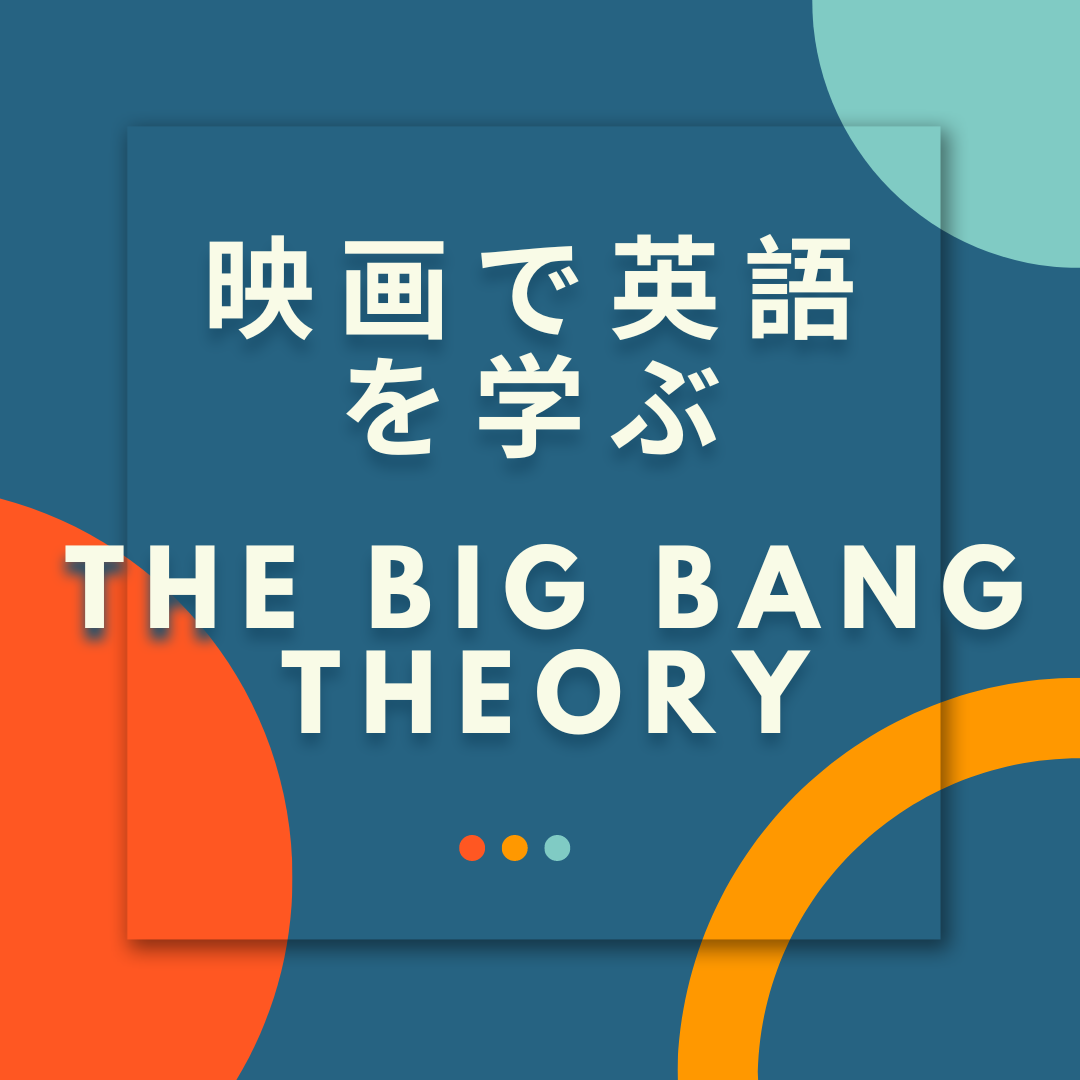The Big Bang Theoryを使って日常会話の勉強をしています。自分の勉強も兼ねて、気になる用語や表現について解説をしていきます。
今回はシーズン3のエピソード1の冒頭です。シェルドン、レナード、ハワード、ラージの4人は、3か月間の北極での探索を終え、家に戻ってきました。
Leonard: Oh, thank God we’re home.
レナード:ああ、よかった。
Howard: I can’t believe we spent three months in that frozen hell.
ハワード:ああ、よかった: あの凍てつく地獄で3ヶ月も過ごしたなんて信じられない。
Raj: It was like a snowy nightmare from which there was no awakening.
ラージ:まるで雪の悪夢のようで、そこから目覚めることはなかった。
Sheldon: I don’t know what Arctic expedition you guys were on, but I thought it was a hoot and a half.
シェルドン:君たちがどんな北極探検をしていたのか知らないが、僕は楽しかったと思うよ。
– Arctic:北極(南極はAntarctic)
– A hoot and a half:とても楽しい、笑いが絶えない
***シェルドンは、家に入る直前にお母さんに電話をしています。***
Sheldon: Oh, hi mom. No, I told you I’d call you when I got home, I’m not home yet. (Walks through door) Alright, I’m home. The Arctic expedition was a remarkable success, I’m all but certain there’s a Nobel Prize in my future. Actually, I shouldn’t say that. I’m entirely certain. No, mother, I could not feel your church group praying for my safety. The fact that I’m home safe is not proof that it worked, that logic is Post Hoc Ergo Propter Hoc. No, I’m not sassing you in Eskimo talk.
シェルドン: ああ、やあ、母さん。いや、帰ったら電話するって言ったでしょ、まだ帰ってないんだ。(ここでシェルドンが家の中に入ります。)さて、いま家に着いたよ。北極探検は大成功だった。ノーベル賞の受賞は確実だ。いや、そう言うべきではないな。(ノーベル賞は)間違いない。いや、母さん、教会グループが僕の無事を祈ってくれているのを感じることはできなかったよ。僕が無事で家にいるという事実は、それ(祈り)がうまくいったという証拠にはならないよ。その論理は前後即因果の誤謬だよ。いや、エスキモー語で嫌味を言ってるんじゃないよ。
– Post Hoc Ergo Propter Hoc:ある事象が別の事象の後に起きたことを捉えて、前の事象が原因となって後の事象が起きたと判断する誤謬
– Sass:生意気なことを言う(例:She`s sassy:彼女は生意気だ)
Leonard: I’m going to go let Penny know we’re back.
レナード:ペニーに帰ってきたことを伝えてくるよ。
Sheldon: Mother, I have to go. Yeah, love you. Bye. (To his spot) Hello, old friend. (Sits) Daddy’s home.
シェルドン:お母さん、行かなきゃ。うん、愛してるよ。じゃあね。(自分のソファーに対して)ハロー、昔からの友達。(座って)パパが帰ってきたよ。
***レナードがペニーに会いにペニーの部屋に行きます。***
Penny: Leonard, you’re back.
ペニー: レナード、帰ってきたんだね。
Leonard: Yeah, I just stopped by to say… (she grabs him and kisses him) Yeah, so, hi!
レナード: うん、ちょっと挨拶に寄ったんだ・・・(ペニーがレナードを掴んでキスをします。) うん、それで、ハイ!
Penny: Hi! (They stumble, kissing, into her apartment and slam the door shut)
ペニー:ハイ!(二人はキスしながら、ペニーの家に入りドアを閉めてしまいます。)
Howard: Dammit, I should have gone over and told her we were back.
ハワード: くそ、戻ってきたって僕が言いに行けばよかった。
– Go over:(ある場所に)行く
Raj: Yeah, it was first come, first served.
ラージ:ああ、先着順だったんだ。
– First come, first served.:先着
***レナードがペニーに会っている間、シェルドンは自身の発見についてハワードとラージに語ります。***
Sheldon: I just want you both to know, when I publish my findings, I won’t forget your contributions.
シェルドン: 二人に知っておいてほしいんだけど、僕が研究成果を発表するとき、君たちの貢献を忘れないよ。
– Contribution:貢献
Howard: Great.
ハワード: ありがとう。
Raj: Thanks.
ラージ:ありがとう。
Sheldon: Of course, I can’t mention you in my Nobel acceptance speech, but when I get round to writing my memoirs you can expect a very effusive footnote, and perhaps a signed copy.
シェルドン: もちろん、ノーベル賞の受賞スピーチで君たちのことに触れることはできないけど、回顧録を書くことになったら、素晴らしい脚注と、おそらくサイン入りの本を期待していいよ。
– memoir:回顧録
– effusive :あふれるばかりの 感情むき出しの
Raj: We have to tell him.
ラジ:彼(シェルドン)に言わなきゃ。
Sheldon: Tell me what?
シェルドン: 何を?
Howard: Damn his Vulcan hearing.
ハワード: ヴァルカン人並みの聴力だ。
Sheldon: You fellows are planning a party for me, aren’t you?
シェルドン: 君たちは僕のためにパーティーを計画しているんだろう?
Howard: Okay, Sheldon, sit down.
ハワード: シェルドン、座ってくれ。
Sheldon: If there’s going to be a theme, I should let you know that I don’t care for luau, toga or under the sea.
シェルドン: テーマがあるのなら、ルアウ(ハワイ語で「宴」)、トーガ(古代ローマ市民が着用した外衣)、海中には興味がないことを伝えておくよ。
Howard: Yeah, we’ll keep that in mind, look, we need to talk to you about something that happened at the North Pole.
ハワード: 分かった。覚えておくよ。いいか、北極で起きたことについて話があるんだ。
– North Pole:北極
Sheldon: If this is about the night the heat went out, there’s nothing to be embarrassed about.
シェルドン: 暖房が切れた夜のことなら、何も恥ずかしがることはないよ。

Go out:たくさんの意味のある句動詞ですが、ここでは「機能しなくなる」の意味です。
例:The brakes went out. : ブレーキが利かなかった。
Raj: It’s not about that.
ラージ:そのことじゃないんだ。
Howard: And we agreed to never speak of it again.
ハワード: それに、そのことは二度と口にしなと約束しただろう。
Sheldon: So we slept together naked. It was only to keep our core body temperatures from plummeting.
シェルドン:だから裸で一緒に寝たんだ。体温が下がらないようにするためだったんだ。
Howard: He’s speaking about it.
ハワード:まだあのことを話しているよ。
Raj: For me, it was a bonding moment.
ラージ:僕にとっては、絆を深める瞬間だった。
Howard: Sheldon, you remember the first few weeks we were looking for magnetic monopoles and not finding anything and you were acting like an obnoxious, giant dictator?
ハワード: シェルドン、最初の数週間僕たちが磁気単極子を探してて、何も見つからならず、君が不愉快で巨大な独裁者(dictator)のように振る舞っていたのを覚えているかい?
– Obnoxious:気に障る、不快な
Raj: I thought we were going to be gentle with him.
ラージ:やさしくするんだと思ってた。
Howard: That’s why I added the tator. And then when we found our first positive data, you were so happy.
ハワード: (ラージに対して)だから「Tator」を加えたんだ。(シェルドンに対して)そして初めてポジティブなデータを見つけた時、君はとても喜んだ。

Dictatorが「dic」と「tator」から構成されており、「dic」が「dick」と音が似ていることから掛けているものと考えられます。
Sheldon: Oh, yes. In the world of emoticons, I was colon, capital D.
シェルドン:ああ、そうだね。顔文字の世界では、僕は大文字のDでコロン(:D)だった。
Howard: Well, in actuality, what your equipment detected wasn’t so much evidence of paradigm-shifting monopoles as it was… static from the electric can opener we were turning on and off.
ハワード: 実際のところ、君の装置が検出したのは、パラダイムシフトのモノポールの証拠というよりも、僕らがスイッチを入れたり切ったりしていた電動缶切りの静電気だったんだ。
– Static:静電気
Raj: He just went colon, capital O.
ラージ:大文字のO(:O)になった
Sheldon: You tampered with my experiment?
シェルドン:僕の実験に手を加えたの?
– Tamper:改竄する
Howard: We had to.
ハワード:そうするしかなかったんだ。
Raj: It was the only way to keep you from being such a huge Dickensian. You see that? I added the ensian.
ラジ:君がディケンジアンにならないようにする唯一の方法だったんだ。分かる?「ensian」を追加したんだ。
Sheldon: Did Leonard know about this? Leonard’s my best friend in the world. Surely Leonard didn’t know.
シェルドン:レナードはこのこと知ってたの?レナードは世界一の親友だ。きっとレナードは知らなかったはずだ。
– Surely:間違いなく、きっと
Howard: Actually, it was his idea.
ハワード: 実は彼のアイデアなんだ。
Sheldon: Of course it was. The whole plan reeks of Leonard.
シェルドン: もちろんそうだよな。計画全体がレナードの臭いがする。
– Reek:臭気、嫌な臭い


